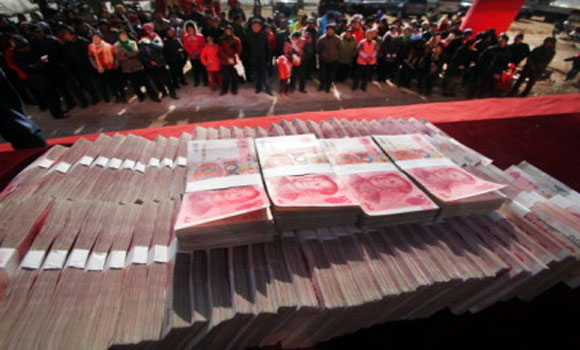investmentwatchblog
Anchor: On Jan. 21, the mainland’s central bank injected an unprecedented amount of funding with more than 370 billion RMB. This action attracted international media attention towards China’s “money shortage”. Hong Shengli, the lead researcher of Guo Qing Nei Can journal in Beijing, and Dr. Chen Zhifei, a professor of economics at the City University of New York, will explain the reasons for the shortage of money. Please watch the report from NTD TV reporter Tang Yin.
Reporter: On Jan. 21, the Central Bank launched the “255 billion yuan ($42 billion) reverse repurchase agreements”, including 75 billion 7 day reverse repurchase agreements and 180 billion 21 day reverse repurchase agreements, which hit a new high position within around 11 months. Until Jan. 20, the Central Bank had already provided 120 billion yuan in short-term liquidity to large commercial banks by using the standing lending facility (SLF).
“Reverse Repurchase” agreements means the central bank increased the supply of money to the market by buying securities from primary dealers.
These unprecedented large actions from the central bank caused media attention on China’s money shortage issue, which included the Wall Street Journal and CNN.
Gong Shengli, the lead researcher of the Guo Qing Nei Can journal in Beijing analyzed that the huge amounts of money injected by the Central bank in China is related to the accelerating recovery of the U.S. dollar in the United States. The Central bank in China plans to prevent the money shortage.
Gong Shengli: There is a massive contraction on the loose monetary policy in USA. If the dollar were to recover, there wouldn’t be enough money in the money market. China will be greatly affected as other currencies on the market may fill in.
Dr. Chen Zhifei, the professor of economics at the City University of New York analyzed that the U.S. economy has bottomed out. Therefore, the United States Federal Reserve Bank decided to cancel the loose monetary policy. If the U.S. dollar has recovered, the RMB exchange rate could be lowering.
On Jan. 20, the Shanghai Interbank Offered Rate (Shibor) rose universally. The industry exclaimed, “money shortage has come back”.
The stock market was hit due to the rise in market rates. The Shanghai Composite Index fell below the 2,000 points mark,which is its lowest level in nearly six months.
After the reverse repos news came out, the inter-bank market got quite excited. The interbank seven-day repo rate fell to 5.5% on Jan. 21, which is a significant decline by comparing it with the 7.5% drop on Jan. 20. The money market rates have stabilized quickly.
Chen Zhifei: The central bank has focused on the main urgent needs. There is no specific strategy for long-term markets, including easing the economy. It shows that China’s economy is very fragile. The central bank also knows that it can not bear such a long-term risk. The only way is to provide short-term support.
For this massive injection of funds, the official claims is, that the target is to strengthen the liquidity of the banking system. Cao Fengqi, the director of the Finance and Securities Research Center of Guanghua School of Management at Peking University, pointed out that according to a practical demands, the money shortage could happen without the massive currency. The massive currency issued shows the efficiency of capital utilization is getting worse.
The industry insiders estimate that 21 day reverse repos stretch across the Chinese New Year, which could be sufficient to ensure the supply of funds over the year and pause the money shortage worries. However, the reverse repos will expire after the Chinese New Year. There is still a possibility of capital return. It does not mean that loose monetary policy will be shifted.
Chen Zhifei believed that it is not optimistic with the situation after the Chinese New Year. Besides, there could be bigger worries according to China’s economic structural problems.
Chen Zhifei: After the economic crisis, the central government provided a lot of money, which has been invested in real estate and infrastructure projects with very low or negative returns. These debts are going to expire and these infrastructure projects, such as high-speed railway, are losing money. Then these debt problems caused a shortage of money. The lenders are mainly the central and local governments.
According to the report from CNN TV on Jan. 21, analysts are worried that the new credit may no longer generate strong economic returns. The ballooning of borrowing may also undermine economic growth. The reports also mentioned that the central bank allows a significant increase in interest rates periodically. Then the next step will be the re-injection of cash to ease the credit crunch.
????2014???????
http://www.ShenYunPerformingArts.org/


